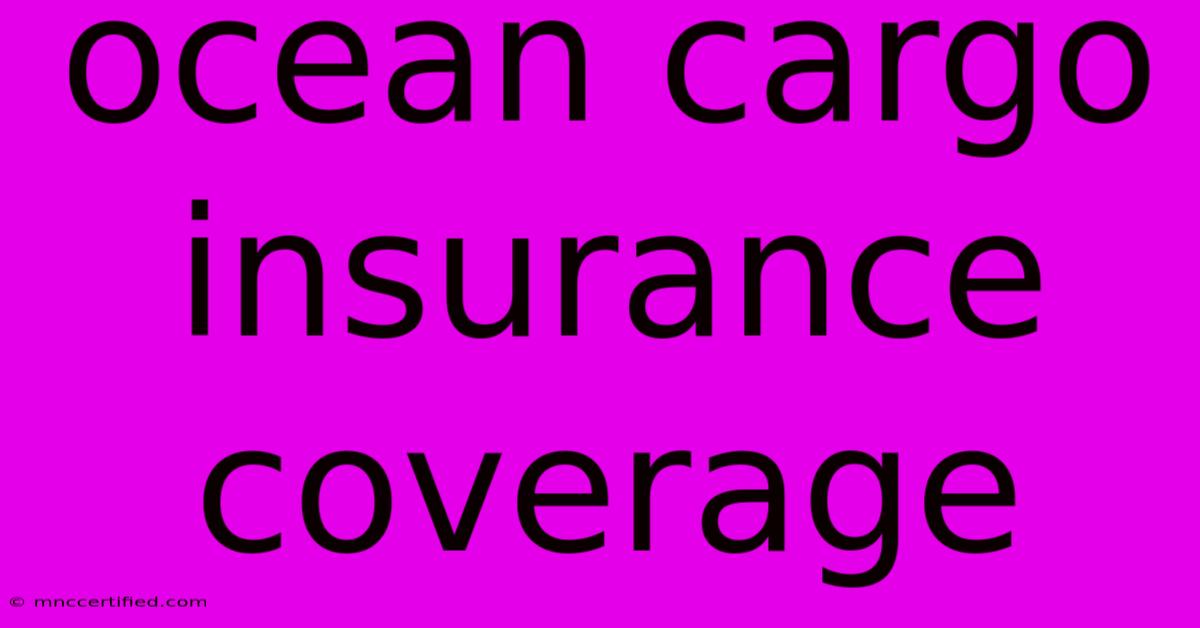Ocean Cargo Insurance Coverage

Table of Contents
Ocean Cargo Insurance Coverage: A Comprehensive Guide for Shippers
Shipping goods across oceans presents inherent risks. From storms and piracy to theft and damage, unforeseen events can lead to significant financial losses. That's where ocean cargo insurance comes in, offering crucial protection for your valuable shipments. This comprehensive guide will delve into the various types of coverage, key considerations, and how to choose the right policy for your needs.
Understanding the Risks of Ocean Cargo Transportation
Before exploring insurance options, it's vital to understand the potential perils your cargo faces during ocean transit. These risks can be broadly categorized as:
- Perils of the Sea: These include natural disasters like storms, hurricanes, typhoons, and even earthquakes that can damage or destroy your goods.
- Accidental Damage: This encompasses incidents like collisions, groundings, and fire onboard the vessel.
- Theft and Piracy: The risk of theft or piracy, especially in certain high-risk areas, is a serious concern for shippers.
- Handling and Storage Damage: Damage can occur during loading, unloading, and storage at ports and terminals.
Types of Ocean Cargo Insurance Coverage
Ocean cargo insurance policies are typically based on the Institute Cargo Clauses (ICC), a set of standardized clauses developed by the International Underwriting Association (IUA) in London. The most common types of coverage are:
1. Institute Cargo Clauses (ICC) A:
This provides the broadest coverage, insuring against all risks of loss or damage except those specifically excluded in the policy. This includes perils of the sea, fire, stranding, collision, and theft, among others. It's the most comprehensive and, consequently, the most expensive option.
2. Institute Cargo Clauses (ICC) B:
ICC B offers wider coverage than ICC C but is less extensive than ICC A. It covers a wide range of risks, including most perils of the sea and accidental damage, but excludes certain risks like inherent vice (damage caused by the nature of the goods themselves) and delays.
3. Institute Cargo Clauses (ICC) C:
This offers the narrowest coverage, limiting protection to specific named perils, typically including fire, stranding, collision, and sinking. It is generally the most affordable option but provides the least protection.
Choosing the Right Ocean Cargo Insurance Coverage
Selecting the appropriate coverage depends on several factors:
- Value of the Cargo: For high-value shipments, the comprehensive protection of ICC A is usually recommended. For less valuable goods, ICC B or even ICC C might suffice.
- Nature of the Goods: Certain goods are inherently more susceptible to damage than others. Fragile or perishable items may require broader coverage.
- Transit Route: Routes passing through high-risk areas might necessitate higher levels of coverage to account for increased risks of piracy or other incidents.
- Budget: The cost of insurance is a crucial factor. Balancing the cost of premiums with the potential financial impact of a loss is vital.
Beyond the Institute Cargo Clauses: Additional Considerations
While the ICC clauses form the foundation of most ocean cargo insurance policies, several other factors should be considered:
- War Risks: This is often a separate coverage, adding protection against losses due to war, civil commotion, or strikes.
- General Average: This refers to the principle where losses are shared proportionately among all parties involved in a voyage if a sacrifice or expenditure was made to save the vessel and cargo from a common peril.
- Freight Insurance: This covers the cost of freight in case of loss or damage to the goods.
Securing Ocean Cargo Insurance: Tips for Shippers
- Work with a reputable insurance broker: A broker can help you navigate the complexities of insurance and find the best policy for your needs.
- Clearly describe your cargo: Accurate and detailed information about your goods is crucial for accurate valuation and risk assessment.
- Review the policy carefully: Before signing, make sure you understand the terms, conditions, and exclusions of the policy.
- Maintain accurate records: Keep records of all shipping documents, insurance policies, and invoices in case of a claim.
Ocean cargo insurance is a crucial element of international trade. By understanding the different types of coverage available and carefully choosing a policy that aligns with your specific risks and budget, you can protect your valuable shipments and mitigate potential financial losses. Remember to consult with an insurance professional for personalized advice.

Thank you for visiting our website wich cover about Ocean Cargo Insurance Coverage. We hope the information provided has been useful to you. Feel free to contact us if you have any questions or need further assistance. See you next time and dont miss to bookmark.
Featured Posts
-
Insurance Risk Services Portal
Nov 27, 2024
-
Confirmed Starting Xi Bayern Vs Psg
Nov 27, 2024
-
Richard Coles I M A Celeb Journey
Nov 27, 2024
-
Armed Security Guard Insurance
Nov 27, 2024
-
Abrar Salman Ayub Series Tied
Nov 27, 2024